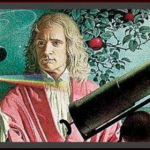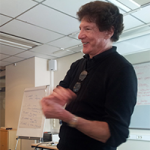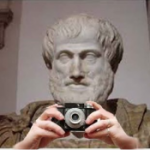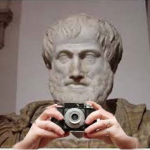 Richard Bach stated a typical New Age notion this way, “There is such a thing as perfection… and our purpose for living is to find that perfection and show it forth…”
Richard Bach stated a typical New Age notion this way, “There is such a thing as perfection… and our purpose for living is to find that perfection and show it forth…”
Is that really our purpose for living? Many people have adopted this concept without question. But there are built-in assumptions here that need to be questioned. For one, we have a job in life and that job is to be better than we are. It reminds me of what Lucy said to Charlie Brown when he told her that we are here to help others. “What are the others here for?” She asked.
People come by the goal of perfection honestly. It has been with us well before the ancient Greeks first invented the Western notion of perfection that they saw as one of life’s highest aspirations. Plato wrote that to reach perfection, one had to transcend the imperfection of reality and strive for a perfect state in which such things as beauty, justice, or goodness are in an ideal or complete condition. Plato thought that philosophers’ had the job of contemplating the nature of the “good,” and by doing so, perfected themselves.
Predating the ancient Greeks, Eastern religions such as Hinduism saw perfection as its primary spiritual goal. In their tradition and teachings, perfection means to make the “soul the real master of oneself,” to be above the senses, passions, and worldly concerns. By overcoming ignorance and ego, one can reach “enlightenment,” which is seen as a perfect state of being, knowledge, and understanding.
Aristotle thought of perfection as potential being fully realized and expressed. Later, St. Thomas Aquinas, who was deeply influenced by Aristotle, concluded that perfection should be one of Christianity’s highest goals. To both Aristotle and Aquinas, their concept was this: that we contain certain potentials that have the possibilities of being developed in the future. They believed that the purpose of potential was to seek fulfillment. The stronger the potential, the more intensity its fulfillment. Therefore, potential was a dynamic force that had its own unique purpose, that of reaching the full expression and realization of what was possible.
Let’s take a moment to explore the underlying assumption of this concept. Your gifts, such as talents and natural abilities, are your potential. Potential, according to Aristotle, has a built in dynamic, that of striving to be fulfilled. If you have certain gifts such as talent or great intelligence or mechanical ability or mathematical aptitude, are you obliged to fulfill these attributes? Does the very existence of aptitudes form your life-direction, mandate a life-purpose that is ordained, in which there is no free choice?
It is important not to confuse perfection with excellence. That which is perfect is without flaws, excellence simply means “the state or quality of excelling or being exceptionally good; an action, characteristic, feature in which a person excels.” The irony is that one can be perfect and not be excellent, and one can be excellent at something, and not be perfect. These two conditions are vastly different and independent from each other. Excellence usually includes a high degree of imperfection that is an aspect of reaching excellence.
If you have the talent to become a barber, do you have to spend your life cutting hair? If you are good at math, do you need to become a mathematician, or scientist, or engineer? If you excel at playing the piano, do you need to become a professional musician? To what degree do you have to forge a life based on your natural talents? To what degree must your talents govern your destiny?
Schools give their students aptitude tests designed to measure their abilities. Then, guidance counselors sit down with these students, and give them advice. Their advice usually suggests pursuing a career based on their aptitude. If the student is good at math, become an engineer; if you are organized, become a manager; if you are artistically talented, become a graphic artist; if you are good at communication, become a journalist. For many, by following their guidance counselor’s advice, they find themselves in careers they never cared about, and, once they get to middle-age, they are ready for their midlife crisis. They know there must be more to life than they have experienced, but they are unable to reach something better through the compromises upon which they have built their lives. This is because they have based their lives on their attitudes and not on their true desires. They thought they were obligated to develop their talents and abilities independently from their own aspirations. For many, their life-direction was determined by some talent they had when they were 14 years old. This is the dark side of Aristotle’s notion of potential seeking perfect fulfillment.
Of course, the deeper basic premise is that people cannot learn and develop unless they already have gifts built into the circuitry. According to this mentality, you should base your life on your aptitude rather than your true desires. Therefore, your actual questions of true desires go unanswered. These true desires don’t go away simply because they are unaddressed. They go underground, waiting for a full-fledged midlife crisis to set them free.
Here is a basic, yet profound, question: if you have talent and abilities, are you obligated to develop them? Or, are you free to live your life the way you see fit, pursuing your own aspirations, independent of your talents and abilities? Many people think their job in life is to develop their gifts. Often, this notion is seen as their life purpose. Furthermore, they see their purpose as connected with their sense of themselves, their identity. They think that once identity is tied with purpose, how well they develop their gifts defines them. But this is a no-win situation. There can be no final success since there is no way to reach the ideal of perfection, no matter what your gifts are. An unwinnable game like this leads to obsession. This, in turn, leads to constant frustration and dissatisfaction with oneself, with life, with the world in general. Nothing is ever good enough and each success is tainted with the innate demand to do better and be better than is humanly possible.
Does the person who has fewer gifts have less responsibility and obligation in life? Are they freer than someone who has great talent and abilities? If that were so, then many people would wish for fewer gifts because your talents and abilities control their fate. The underlying assumption for a majority of people is that they must use and develop their gifts. That is why you’ve been given them in the first place. So if you have talent for drawing and math, and your brother has talent for athletics, you should become an architect, and he should be a football coach, no matter what you might want personally. Your wishes don’t count. At least not if you assume that you must honor your own potential by pursing a life built around them.
Must all potential seek its perfect realization?
Do you have to use your gifts?
If your Aunt Sally gave you a horrendous pair of pajamas for Christmas, do you have to wear them?
If you have a gift for playing the harmonica, do you have to play the harmonica?
 It was sad to hear of the passing of David Bowie, one of the most creative and talented artists in music and film. This blog is not a eulogy, and there are countless very good ones we can read. I wanted to talk about Bowie the artist, and how he positioned himself to become a true master of the creative process.
It was sad to hear of the passing of David Bowie, one of the most creative and talented artists in music and film. This blog is not a eulogy, and there are countless very good ones we can read. I wanted to talk about Bowie the artist, and how he positioned himself to become a true master of the creative process.








